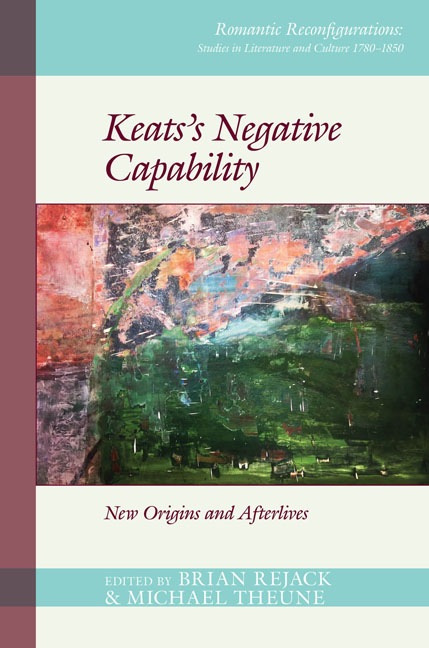Book contents
- Frontmatter
- Contents
- List of Figures
- Acknowledgments
- List of Abbreviations
- List of Contributors
- Preface
- Introduction: Disquisitions: Reading Negative Capability, 1817–2017
- Part I ‘swelling into reality’: New Contexts for Negative Capability
- Part II ‘examplified throughout’: Forms of Negatively Capable Reading
- Part III ‘pursued through Volumes’, Volume I: Negative Capability in Twentieth- and Twenty-First-Century American Poetry
- Part IV ‘pursued through Volumes’, Volume II: Adaptations, Appropriations, Mutations
- Afterword: Reading Keats's Negative Capability
- Bibliography
- Index
16 - Negative Capability in Dialogic Context
- Frontmatter
- Contents
- List of Figures
- Acknowledgments
- List of Abbreviations
- List of Contributors
- Preface
- Introduction: Disquisitions: Reading Negative Capability, 1817–2017
- Part I ‘swelling into reality’: New Contexts for Negative Capability
- Part II ‘examplified throughout’: Forms of Negatively Capable Reading
- Part III ‘pursued through Volumes’, Volume I: Negative Capability in Twentieth- and Twenty-First-Century American Poetry
- Part IV ‘pursued through Volumes’, Volume II: Adaptations, Appropriations, Mutations
- Afterword: Reading Keats's Negative Capability
- Bibliography
- Index
Summary
There is neither a first nor a last word and there are no limits to the dialogic context (it extends into the boundless past and the boundless future). Even past meanings, that is, those born in the dialogue of past centuries, can never be stable (finalized, ended once and for all)—they will always change (be renewed) in the process of subsequent, future development of the dialogue.
Such is a claim made by the Russian thinker Mikhail Bakhtin in his last published essay. Its wide sweep can, of course, be applied, in theory, to any text or, in Bakhtin's preferred term, utterance of human communication. But it seems especially applicable to Keats's famous phrase ‘negative capability’ and to the remarkable afterlife of the formulation that suddenly came to him, ‘dovetailed in [his] mind’, as he reported to his brothers George and Tom, in late December of 1817 (LJK, I: p. 193).
There is a striking variety of meaning in the ‘dialogic context’ within which Keats's original phrase has taken on meaning, new and old, since then. A recent and cursory Google search shows over 800,000 ‘results’—references, definitions, allusions, elaborations, appropriations, even coincidental juxtapositions of the two words—as the invocation of Keats's richly paradoxical and teasingly ambiguous phrase negative capability has in recent decades gone well beyond the context of literary history. It reaches into psychoanalysis (Jungian as well as Freudian), organizational leadership studies, and the proliferating mediations of new media and popular culture. Following Bakhtin's example, however, I intend to concentrate on a dialogic context within literary history. For all of his wide learning and extra-literary interest in ‘speech genres’ of all sorts and conditions, ‘aesthetic activity’, as he called it early in his career, lies at the heart of Bakhtin's thought.
Most often, Romantic and Romanticist, even Modern and Modernist, analysis and interpretation consider Keats's phrase and concept in terms of origin and influence, terms based on the idea of a singular personal expression. What did Keats himself mean? By whom was he most influenced? Whose earlier meaning is being faithfully rehearsed or divergently reformulated? And later, after the fact, whom has Keats most influenced with the formulation ‘negative capability’ and how faithful to his original meaning are these later invocations?
- Type
- Chapter
- Information
- Keats's Negative CapabilityNew Origins and Afterlives, pp. 245 - 258Publisher: Liverpool University PressPrint publication year: 2019



